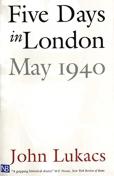
by Lukacs John
Paperback- $13.99
Click on the ORANGE Amazon Button for Book Description & Pricing Info
Overall rating:
How would you rate this book?
Member ratings
Five Days in London, John Lukacs, author; Geoffrey Howard, narrator
The book is very well researched. The author uses actual historic documentation that we could not use today, sadly, because currently, we have a greater use of the internet and digital correspondence. There is far less use of actual handwritten, personal communication from the sources. In the form of personal letters, diaries and other important missives, this history unfolds for us as Lukacs reveals it. As he describes the most important five days of WWII, from May 24th, 1940, to May 28th, 1940, we become aware of the very real and dramatic consequences of the discussions and meetings that took place then. The influence of everything that occurred regarding world leaders and the outcome of Hitler’s war, was monumental. Just five days changed what could have been a far worse outcome and nightmare for the world.
Although this brief book is about consequential decisions made by the Allies, between those five days, many other details of the war are highlighted, as well. It is these five days, however, in which conversations and meetings took place that ultimately determined the outcome of Hitler’s Final Solution, and his dream of establishing his Third Reich. The most difficult concept for me, and perhaps for other readers to understand, is that ordinary people, people who believed they were healthy and sane, actually agreed with the barbaric methods of the National Socialists and pretended to be unaware of their brutality and murderous behavior. It is simply hard to believe that so many had so great a capacity to either commit evil or even disregard it.
In hindsight, it may appear to be obvious that if Hitler had not misinterpreted events or made a particular choice or decision or if England had not continued to fight, or if France had not been in the fight as long, or even later on if America had not eventually been drawn into the fray, that the outcome of the war could very well have been far different. Many more of us might be speaking German today, and many more of us would have died or been displaced. At the time, however, it was impossible to know the outcome, because hindsight is blind to the future. Fortunately for the world, Hitler and his followers were denied the opportunity to create his perfect Aryan Nation as he would have destroyed everything in the path that would have prevented its existence.
As Lukacs illustrates the decisions made that ultimately determined the outcome of the war, many of the names he mentions will be recognized, like Kennedy, Chamberlain and Petain, but others were new to me, and might be to you. With his description of the situation at Dunkirk and the evacuation of the military, I learned that all of the weapons were left behind, but fortunately, the soldiers were not. More than 300,000 of the British and many of the French soldiers were rescued. It was an amazing feat of heroism by all those involved. Why did Hitler let the military leave? What did Hitler actually want to accomplish with his attack on Great Britain? Did he want to destroy or dilute their power and presence in Europe?
As Hitler marched across Europe with far less opposition than anticipated, it was a guessing game, as every leader tried to determine the purpose of the other. The one with the greatest success in determining what the other was thinking would win. It seems that German soldiers were better trained, had far superior weapons and were determined to win with their arrogance, ability to commit heinous acts with abandon, and excessive Nationalism. England, however, was fiercely patriotic and Churchill was determined to fight to the death. He was an inspiration with his eloquence and courage. In 1940, in May, though, it was a toss-up as to who would succeed and either bring the world to its knees or save it to survive another day. Have we learned anything from our history? Are our political goals still at odds with our military goals? Is it possible to put our military leaders and our political leaders on the same page, so that the security of the world is the priority rather than their personal biases and goals?
After reading this book, I am even more outraged, personally, about the betrayal of Churchill by the British, after the war. They should have supported him as a hero. Without him, the English and many others in the world would have been murdered or forced to live under German rule. I believe that Churchill was the man necessary for that time, just as Trump is the man necessary for our present time in America, today.
As we witness incomprehensible protests today, as terrorists are supported and their victims denigrated, one can only hope that books like these will inspire others to further research their own history. They need to remember the sacrifices made because of insane power grabs and faulty reasoning. If that happens, perhaps it will have served a greater purpose uplifting humanity and benefiting the world
I personally sensed an interesting similarity between the way Churchill was, and Trump is, perceived. Both are, perhaps, not personally well-liked, with or without good reason, but their courage, patriotism and ability to solve problems should supersede any criticism, in the end. Both, however, were at one time, used and spit out by their enemies and ultimately betrayed by them, though I believe that they were the actual heroes of their time.
Churchill fought on in the face of impossible odds, and so did our current President elect so recently.
Book Club HQ to over 90,000+ book clubs and ready to welcome yours.
Get free weekly updates on top club picks, book giveaways, author events and more








